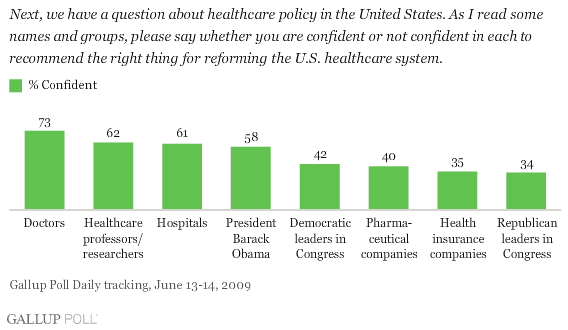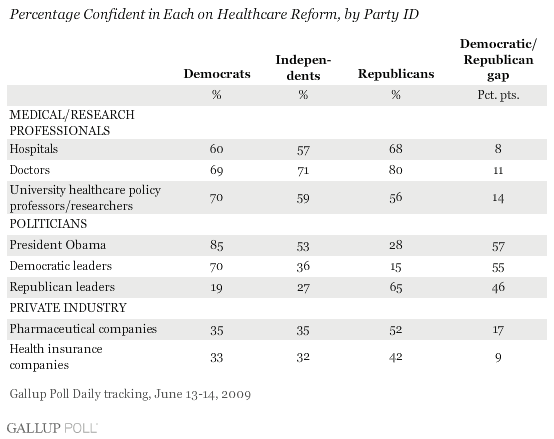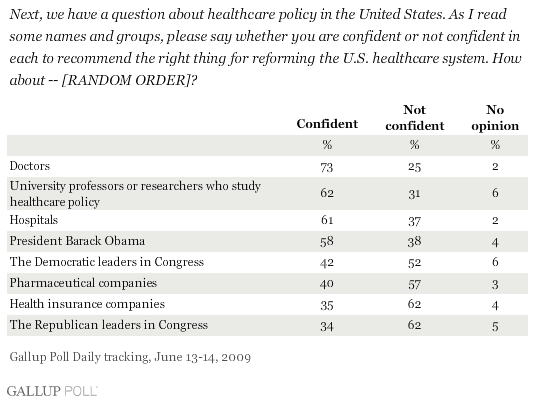PRINCETON, NJ -- Nearly three-quarters of Americans (73%) say they are confident in doctors to recommend the right thing for reforming the U.S. healthcare system. That is significantly higher than the public confidence extended to President Barack Obama, as well as to six other entities that will be weighing in during the emerging healthcare reform debate.

While the public trusts the views of doctors the most, more than 6 in 10 Americans are also confident in university professors or researchers who study healthcare policy (62%) and in hospitals (61%).
At 58%, Obama fares better than congressional leaders on both sides of the aisle; however, the Democratic leaders in Congress have more credibility on healthcare reform than do the Republican leaders: 42% vs. 34%.
In terms of the major private-sector healthcare debate participants, confidence in what the pharmaceutical companies might advocate as the solution is only slightly higher than what health insurance companies might propose, 40% vs. 35%.
Medical Professionals Have Bipartisan Reach
Doctors, hospitals, and university researchers may not generally be viewed as political powerhouses. But when it comes to healthcare reform, all three entities have a potentially important advantage over government leaders. As the Gallup Poll results suggest, they are well-positioned to have bipartisan clout with the public.
Obama and the leaders of the two parties in Congress are trusted on healthcare by most of their own party's members, but are distrusted by most of the opposing party's. By contrast, large majorities of Republicans, independents, and Democrats say they have confidence in what doctors, hospitals, and university professors and researchers recommend on healthcare.

Obama stands out among elected officials on this issue because he not only enjoys the confidence of his own party members (Democrats), but he receives majority support from independents. The 53% of independents saying they are confident in Obama to recommend the right thing on healthcare contrasts with only 36% of independents confident in congressional Democratic leaders, and 27% confident in congressional Republican leaders.
Bottom Line
President Obama received a lukewarm response at his speech before the annual meeting of the American Medical Association on Monday in which he outlined his case for enacting comprehensive healthcare reform this year. While the members present reportedly welcomed some of his remarks, some also booed him for failing to endorse limits on medical malpractice awards.
Obama has yet to unveil a comprehensive plan for reforming healthcare; the administration is still sponsoring healthcare forums at the White House and around the country to gather information and ideas. However, given Americans' high regard for doctors' opinions on healthcare reform, Obama may find it important to keep trying to bring the AMA, and other professional doctors' groups, on board with his approach. Of course, public confidence in hospitals and academic experts on the issue is nothing to sneeze at, either; their support for any plan Obama submits could help him counter possible opposition from the medical profession.
Survey Methods
Results are based on telephone interviews with 1,009 national adults, aged 18 and older, conducted June 13-14, 2009, as part of Gallup Poll Daily tracking. For results based on the total sample of national adults, one can say with 95% confidence that the maximum margin of sampling error is ±3 percentage points.
Note: These questions were asked of random half-samples for two nights of Gallup Poll Daily tracking, which interviews 1,000 U.S. adults each night.
Interviews are conducted with respondents on land-line telephones (for respondents with a land-line telephone) and cellular phones (for respondents who are cell-phone only).
In addition to sampling error, question wording and practical difficulties in conducting surveys can introduce error or bias into the findings of public opinion polls.

